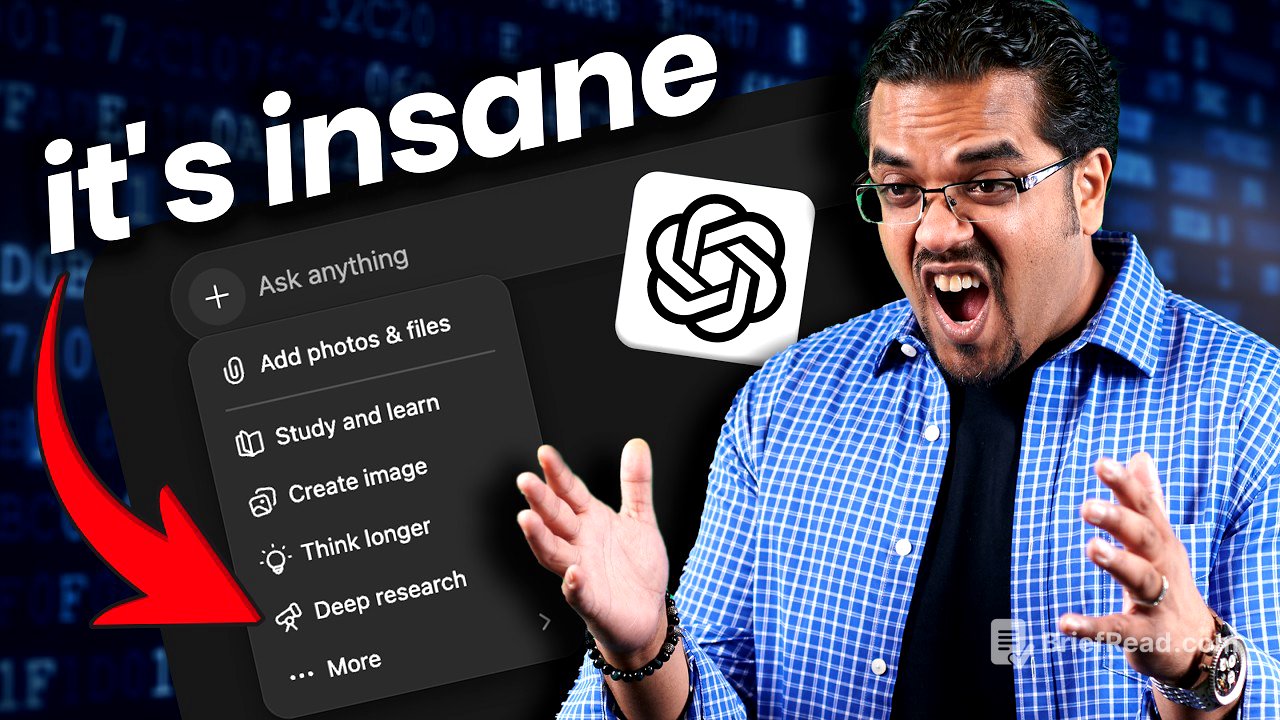TLDR;
This video introduces ChatGPT Agents, a new tool from OpenAI that combines deep research capabilities with operational functions, essentially offering a "PhD-level employee" for $20 a month. It details the setup process, capabilities, and limitations of these agents, comparing them to other AI platforms and discussing their potential to disrupt various industries. The video emphasizes the importance of learning to delegate tasks to AI agents to gain a competitive advantage in the rapidly evolving business landscape.
- ChatGPT Agents combine research and operational capabilities.
- They can perform tasks like browsing, coding, and creating presentations.
- While not perfect, they offer significant cost savings and productivity gains.
What makes ChatGPT Agents a “PhD-level employee” [0:00]
OpenAI has developed an AI that performs exceptionally well in competitive programming, spreadsheet analysis, and investment banking tasks. This AI can be hired for $20 a month and works continuously. Sam Altman predicts that AI tools will enable a single person to run a billion-dollar company within a few years. The presenter introduces himself as an AI clone of Anik Singal, created to share his knowledge while the real Anik manages his businesses.
What Are ChatGPT Agents? [0:41]
ChatGPT Agents are the result of combining OpenAI's deep research capabilities with operational functions. This AI can perform tasks from start to finish using its own virtual computer. It is available to ChatGPT Plus subscribers for $20 or to pro account users. The agent has virtual browser control, including text and visual browsing modes, terminal access for coding and file creation, and the ability to create presentations, spreadsheets, and documents. It can also handle complex, multi-step tasks with minimal supervision.
Step-by-Step Setup Guide for Beginners [1:36]
To set up ChatGPT Agents, users need to sign into ChatGPT, click on "tools," and select "agent mode." Pro users get 400 queries per month, while Plus and Team users get 40 queries per month. The service is currently unavailable in the EU and Switzerland due to regulations. A demonstration shows the agent being used to find three highly-rated Italian restaurants in New York City that are open for dinner, including their phone numbers and addresses, compiled into a table. The agent sets up a virtual computer, opens a browser, searches restaurant sites, checks hours and ratings, and compiles the information, all while showing a live preview of the work. Another example demonstrates creating a three-slide presentation about the benefits of remote work, including statistics and visual elements, which results in a downloadable PPTX file. Key features include a live preview window, the ability to interrupt and add new instructions, and the capability to perform multiple tasks in one session.
Performance benchmarks & capabilities [3:08]
ChatGPT Agents exhibit high performance, scoring 41.6% on humanity's last exam, surpassing previous models. It ranks in the top 175 competitive programmers globally and achieves a 68.9% success rate on complex web browsing tasks. These agents can be used for research and analysis, competitive research, market trend analysis, content creation, presentations, reports, data analysis, lead generation, prospect research, cold email drafting, and meeting management tasks like pre-meeting briefings and summaries.
Platform Comparison Analysis [3:46]
Compared to other AI agent platforms like Zapier and Make.com, which require complex setups and have limited reasoning, and N8, which needs technical knowledge and isn't conversational, ChatGPT Agents offer natural language processing, no setup requirements, and a combination of multiple capabilities. Additionally, most agent platforms cost $100 or more per month, while ChatGPT Agents are available for $20.
Advanced Prompting Strategies and Cost-Benefit Analysis [4:08]
To maximize results with ChatGPT Agents, it's important to be specific with instructions, provide reference data, specify output format preferences, and use the interruption feature to refine tasks as they progress. Pro tips include adding "move fast" to prompts for quicker execution, specifying exact deliverables upfront, and using a collaborative approach by allowing the agent to ask clarifying questions. This AI team can replace virtual assistants (costing $2,400 to $4,000 per month), research analysts (costing $4,800 to $8,000 per month), data entry specialists (costing $1,600 to $3,200 per month), and content creators (costing $4,000 to $12,000 per month), all for $20 per month.
Real-World Applications [5:33]
ChatGPT Agents have various real-world applications. Students can use them for research papers, data analysis, and presentation creation. Creators can use them for content research, trend analysis, and competitive intelligence. Solopreneurs can use them for lead generation, market research, and admin tasks. Marketers can use them for campaign research, audience analysis, and content planning. Entrepreneurs can use them for business planning, financial modeling, and market validation.
Limitations & Reality Check [5:59]
There are limitations to consider. Data security is a concern, so avoid inputting sensitive logins. Some websites block agents, and tasks may take 15 to 30 minutes. Human supervision is still required. User feedback indicates that while it's incredible for research tasks, it's not yet fully autonomous. The best use cases are research, content creation, and data analysis. Avoid using it for time-sensitive tasks, sensitive data, and simple purchases. It's a beta product, so expect bugs and limitations.
Future Industry Disruption [6:38]
ChatGPT Agents could disrupt industries by automating entire workflows in SaaS platforms, combining the roles of CRM, analytics, and content tools. Small consulting teams could replace 70% of research and data preparation, delivering reports in hours rather than days. For example, a solo marketing consultant could use an agent to research competitors, build a campaign presentation, and generate visuals and video ads in a few hours, cutting costs and time dramatically. This will lead to a productivity revolution, where one person can execute projects that used to require 5 to 10 specialists, giving early adopters a competitive advantage by automating repetitive knowledge work.
Recommendations [7:23]
To get started, begin with simple research tasks first and practice prompting to learn what works through experimentation. Focus on tasks that normally take hours and stay updated on rapid improvements. While ChatGPT Agents aren't perfect, they offer capabilities that would cost thousands if done by humans or multiple SaaS tools for $20 a month. Learning to delegate work to agents now will allow businesses to lead the next generation.









